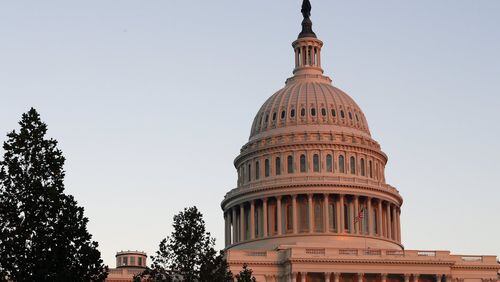Lawmakers return to Washington on Tuesday to face a mountain of must-pass items for September, a workload that threatens to divide lawmakers as leaders look to avoid a government shutdown, debt default and dry coffers at the emergency management agency tasked with rebuilding after Hurricane Harvey.
There are also items of state interest that Georgia lawmakers are hoping to advance, including halting cuts to charity hospitals such as Grady Memorial in Atlanta, refreshing PeachCare’s parent program and extending federal tax credits to benefit the nuclear power project at Plant Vogtle.
Add in a fraught debate over Confederate monuments and whether to stabilize wobbly Obamacare markets and September will be nothing short of a massive headache for lawmakers returning from a month of recess.
All the items on Washington’s to-do list will have an impact roughly 600 miles away in Georgia. Countless local businesses, universities, airports and individuals rely on money from the federal government in the form of jobs, contracts and grants — money that largely wouldn’t flow in a shutdown.
Many state and local officials are also waiting to see how federal lawmakers handle the biggest items of the day, particularly on health care, before acting themselves.
Many of these eleventh-hour high-stakes fights have become commonplace in Washington in recent years, but tension appears to be higher given President Donald Trump’s blustery relationship with Democrats and a growing number of Republicans.
The pressure on GOP leaders is also higher than in recent years because the party now controls both chambers of Congress and the White House. There is fear that the blame for any major lapse in programs or funding could be pinned on the party, which could have consequences at the ballot box in 2018.
Health care
Lawmakers skipped town for their August break shortly after the Senate failed to pass legislation repealing and replacing Obamacare. Lawmakers have since heard an earful from their constituents regarding their votes.
The GOP effort to scrap the 7-year-old law will be on the back burner this month, but a bipartisan group of senators is looking to quickly strike a modest agreement to stabilize the Affordable Care Act's insurance market in the face of rising premiums.
Both of Georgia's Republican senators, Johnny Isakson and David Perdue, supported all their party's repeal and replacement proposals, but each has indicated in recent days that he is open to a stabilization package.
The devil will be in the details, however, and some Georgia Republicans in the House have suggested they won’t support propping up a law they despise.
“I don’t think that we should be trying to fix the Affordable Care Act,” said U.S. Rep. Buddy Carter, R-Pooler. “What we need to do is to scrap it — it’s been a failed experiment — and start over.”
A less contentious but still monumentally important item on the agenda is legislation reauthorizing the Children’s Health Insurance Program, or CHIP, the federal parent of PeachCare for Kids, the popular Georgia program for uninsured children.
Federal funding for CHIP has only been greenlit through Sept. 30, and by some estimates Georgia is expected to exhaust its current funding by April.
Local lawmakers have been waiting for Congress to act because little wiggle room is expected in the state budget should Washington drag its feet.
There has also been some discussion about attaching to CHIP legislation that would head off planned cuts to the federal program that reimburses charity hospitals such as Grady that treat a higher share of Medicaid and uninsured patients.
If Congress doesn't act by early October, hospitals across Georgia could lose out on perhaps $200 million annually by 2025, a prospect that some stakeholders warn could lead to difficult cuts or facility closures.
Other matters
Going into the August recess, it appeared that the biggest autumn battle would be over Trump’s border wall. Both the White House and Democrats had raised the prospect of a shutdown showdown if the other didn’t back down.
It now appears that fight will be deferred until December in the wake of Hurricane Harvey.
There could be a bigger fight over a potential spending package that includes billions of dollars in emergency money for the Federal Emergency Management Agency, whose coffers are rapidly depleting following Harvey, and raising the debt ceiling. The Treasury Department has estimated that it may not be able to pay all the country’s bills after Sept. 29.
Some conservatives have demanded pledges for government spending cuts in exchange for raising the borrowing limit. Meanwhile, the chairman of the conservative House Freedom Caucus said he opposed combining Harvey aid and a debt-limit increase, which could create headaches for Republican vote-counters.
Before the end of the month, Congress must also reauthorize the federal flood insurance program as well as the Federal Aviation Administration.
Failing to advance the latter would lead to a partial shutdown of the FAA and disruption to operations of the agency, whose responsibilities for air traffic control and aviation safety play a crucial role for Hartsfield-Jackson International Airport, the world’s busiest airport, and hundreds of employees who work for the FAA in Georgia.
U.S. Rep. Bill Shuster, R-Pa., has been pushing to include a measure to privatize air traffic control in the FAA reauthorization. It’s an idea Atlanta-based Delta Air Lines had opposed, but Delta CEO Ed Bastian in July made comments softening his position on the proposal.
Also on the to-do list for Georgia lawmakers is advancing a bill through the Senate that would send hundreds of millions of dollars in tax breaks to Georgia's struggling Plant Vogtle nuclear project. Georgia Power, the project's main partner, told state regulators last week that it planned to move forward on the last-of-its-kind venture, reliant in part on receiving the federal tax credits.
The legislation has already passed the House. It would have to clear the Senate before it could be signed by the president.
Meanwhile, a debate over the display of Confederate images on Capitol Hill and in the states is expected to continue. The topic has proved to be divisive among Georgia lawmakers.
About the Author








